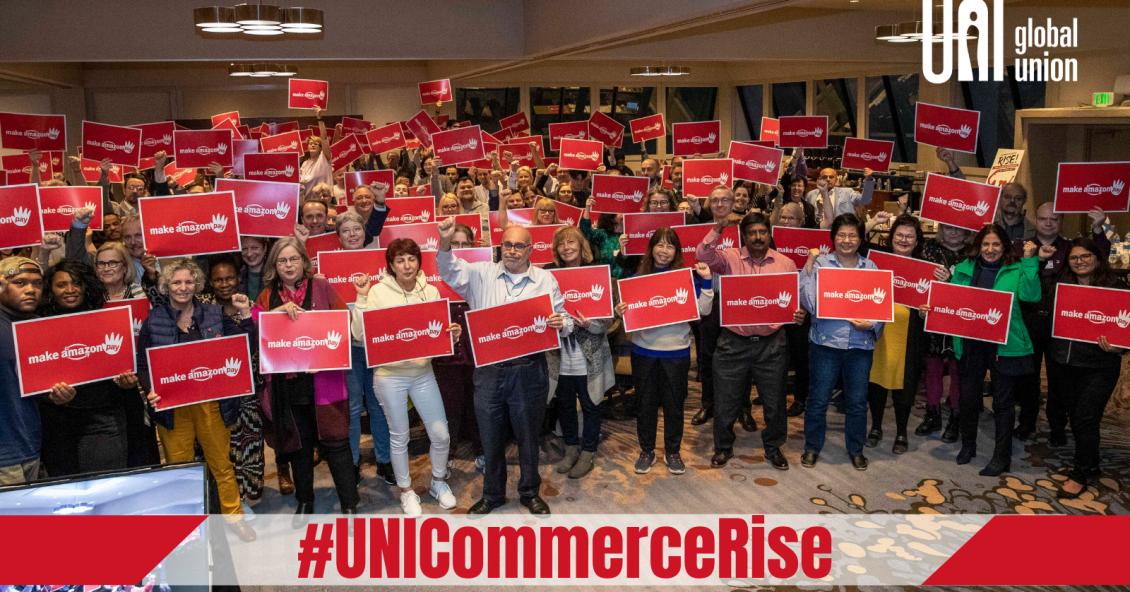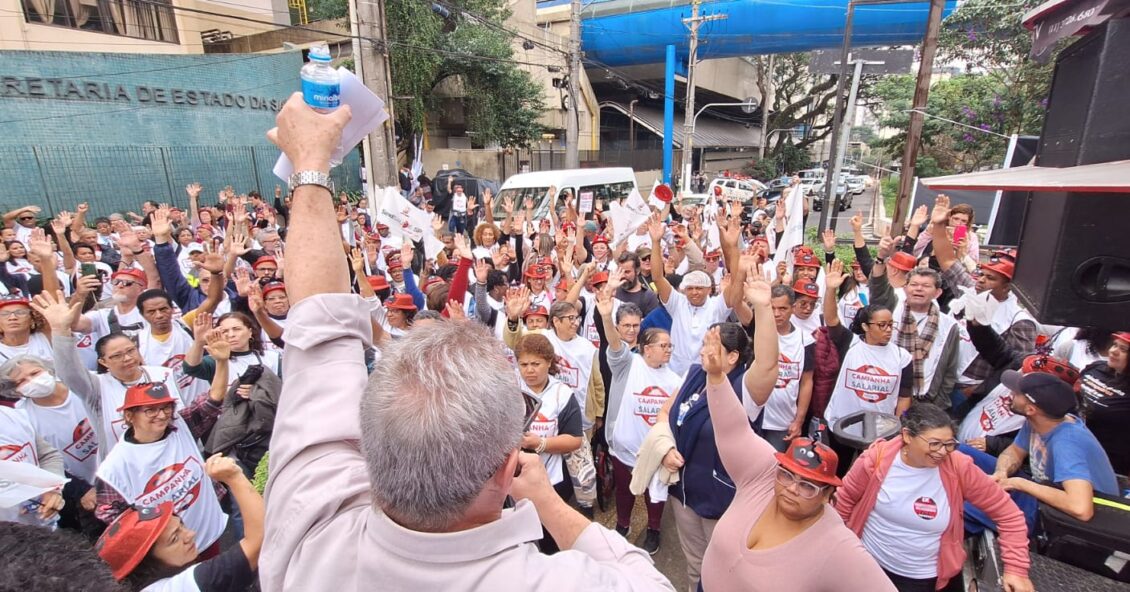UNI Commerce unions adopt ambitious global action plan to meet challenges of our time
15.12.22
Hundreds of union leaders from nearly three dozen countries converged in Atlanta this month for UNI Commerce’s world conference themed “Commerce workers rise! A global movement for our time.” During the gathering, held 7-10 December, UNI’s Commerce sector elected its leadership for the next four years and adopted a bold action plan to grow union power for commerce workers across the globe.
Reporting on past victories and acknowledging the challenges ahead, Mathias Bolton, Head of UNI Commerce, highlighted UNI’s role in securing better conditions, rights and pay for workers across the globe, saying, “We’re in a new moment, where this generation is seeing challenges to unionization that we’ve never seen before. But the people of the world finally realize how important retail workers are, and we need to rise to meet this moment.”
To meet the moment for workers, the sector focused on a strategy with five pillars: building union power; raising e-commerce standards; improving health and safety; building a sustainable future of retail; and forging responsible value and supply chains.
Building union power
Participants learned lessons about increasing worker power and strengthening collective bargaining from across the globe—including in Dominican Republic, Hungary, the Netherlands, Peru, South Africa, South Korea, Turkey, the United States. The conference backed a resolution that will on building union power and influence in the sector, in part, by mandating UNI Commerce to organize global alliances by retail market segments. This will allow the sector—and affiliated unions—to better channel energy into addressing issues that touch workers across not just across national borders but throughout segments, such as food retail and fast fashion.
“Essential workers’ sacrifices during the pandemic were the world’s biggest act of labour solidarity,” said Ruben Cortina, UNI Global Union President, “Our great challenge is how we continue building union power after the pandemic so they will have greater protections in a crisis. Union organizing must always be on the top of the list.”
Starbucks workers also joined the UNI Commerce Global Conference, and the Conference adopted a solidarity statement that supports Starbucks workers’ dedicated fight to win their union.
Declaring e-commerce is commerce
The action plan adopted at the conference also has a strong response to the massive growth of e-commerce. Participants heard about successful union initiatives for e-commerce workers in different countries including Argentina, France, Sweden and the United States; and they used lessons learned to formulate a resolution declaring that “E-commerce is commerce.” UNI Commerce will invest more in organizing e-commerce workers including those employed by platform companies to make sure that they have the same rights as traditional commerce workers and to ensure that e-commerce platforms do not undercut existing worker standards in retail.
Perhaps nowhere is the need to improve conditions in e-commerce more needed than at Amazon. UNI hosted a session on the e-commerce giant with Amazon workers and trade union leaders from Brazil, Germany and the United States that culminated with a solidarity action to support Amazon workers across the globe.
“No matter where we come from or the language we speak, we are a movement that cannot be contained by borders” said Marc Perrone, President of the UFCW, “The people in this room will not rest until equality and justice for working people is achieved. This bond will never be broken.”
Improving health and safety
UNI Commerce affiliates reaffirmed their commitment to stop violence and harassment in commerce—a growing problem in the sector. From Chile to Australia, from Japan to Finland, from Italy to Denmark, the conference put a spotlight on the massive union difference for making work safe. Welcoming the designation of occupational health and safety as a fundamental right by the ILO, the Conference resolved to identify and address the new and growing health and safety risks for commerce workers.
Building a sustainable future of retail
Using case studies from Argentina, Belgium, Germany, Japan, Spain and Sweden, UNI Commerce affiliates discussed the trade union response to the challenges posed by digitalization, new technologies and climate change . They introduced—and passed—a ground-breaking resolution on “Just, Responsible and Inclusive Transition for Decent Work and Climate Justice” as part of the sector’s action plan.
Underlining the importance of the work of UNI Commerce in his region, Marcio Monzane, the Regional Secretary of UNI Americas, said, “We face many great challenges to growing union power and the best way to overcome these challenges is to keep working together to win better conditions for our workers.”
Forging responsible value and supply chains
Welcoming the new model for supply chain governance set in Bangladesh through the International Accord, UNI Commerce supported the expansion of the Accord’s binding arbitration model to other garment sourcing countries and committed to operationalize due diligence to grow union power in the retail supply and value chain for social and environmental sustainability.
“If we are going to change the rules of globalization, we have to do it right. That includes mandatory human rights due diligence” said Christy Hoffman, General Secretary of UNI, “We must push for strong laws to involve unions in due diligence, support our affiliates and work with them to enforce due diligence requirements.”
Electing new leadership
On the closing day, hundreds of UNI Commerce delegates from nearly three dozen countries re-elected Stuart Appelbaum, president of the Retail, Wholesale and Department Store Union, as their Global President. After the unanimous vote, Appelbaum said:
“The challenges before us are enormous, but we know what to do. We have an action plan, and we have to take advantage of this moment. We have to do everything we can to support workers who are making a difference. We have to confront these challenges together in a united way. We have to do it together.”
Daniel Lovera, FAECYS (Argentina), Tomoko Nagashima, UA ZENSEN (Japan), and Linda Palmetzhofer, Handels (Sweden), were also elected global commerce vice presidents. The African vice president will be picked at a later date. A representative steering committee was also selected.


